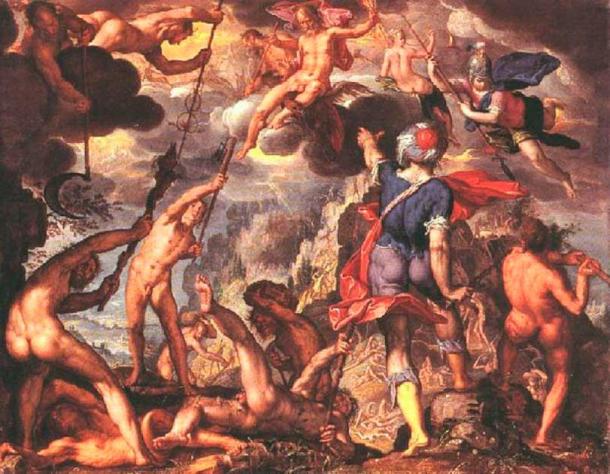[ad_1]
In Disney’s 1997 film Hercules, the Titans are portrayed as natural disasters personified in the form of monolithic, terrible beings. In Greek mythology, however, the Titans were part of the first pantheon of gods. Amongst these Titans was Hyperion, god of heavenly light. There was a great war between the Titans and the Olympian gods, known as the Titanomachy, in which Hyperion and members of his family fought Zeus for control of the earth.
Gaia, Mother Life on Earth, and Mother of Hyperion too
Greek cosmology envisioned the world as a flat disk covered by a dome of brass that was decorated with stars. The river Okeanos ran around its periphery, while beneath lay the underworld, Tartarus. Each of these components was conceived of as a deity: Gaia, the earth; Pontus, the sea; Uranus (Ouranos), the sky; and Tartarus, the underworld.
Gaia was the mother of all life. She gave birth to Hyperion and his eleven Titan siblings through her union with Uranus, personification of the sky, who was also created by Gaia. The Gigantes (the Giants who would ultimately wage war on the gods) and the Cyclopes, were also Gaia’s work. And the Greek sea gods came to Earth through the union of Gaia and Pontus. Finally, she created a mortal man, Erichthonius of Athens, whom Athena adopted as her own child.

Hyperion was the god of heavenly light, and his mother, Gaia, was the earth goddess. ( Romolo Tavani / Adobe Stock)
Hyperion, the Titan God of Light and Wisdom
Amongst the pantheon of the Titanic gods, Hyperion was the god of heavenly light, whose name translates to “he who goes above.” He married his sister Theia (the Titan goddess of the sun and sight) and together they birthed three children: Helios (sun), Selene ( moon), and Eos (dawn).
According to scholars, Hyperion was likely credited by the ancient Grecians as one of the creators of mankind, who bestowed upon them the gift of eyesight. Additionally, Hyperion was credited with ordering the cycle of daylight, thus creating the flow of days, months, and years. Together, Hyperion and three of his brothers, Coeus, Crius, and Iapetus, formed the four pillars that held the sky aloft.
According to some mythological tales, Hyperion was one of the five Titans who ambushed Uranus after he incurred Gaia’s wrath for imprisoning several of her children, the Cyclopes and the Hecatonchires, in Tartarus. Hyperion and his three brothers held Uranus down from the four corners of Earth (north, south, west, and, in Hyperion’s case, east), while a fifth brother, Cronus (leader of the Titans) castrated him with a sickle. Cronus took Uranus’s place as ruler of the universe, but his father prophesied that he too would one day be destroyed by his sons.

This painting by Joachim Wtewael, entitled The Battle Between the Gods and the Titans, was the setting for Hyperion’s greatest heroic act. (Joachim Wtewael / Public domain )
The Titanomachy: Hyperion Goes to War with Zeus
In the aftermath of Hyperion and his brothers’ ambush of their father, Cronus was consumed with fear over the prophesy. Cronus once more imprisoned the Cyclopes and Hecatonchires and began eating his own children. Rhea, Cronus’ wife, however, saved the youngest child, Zeus, and hid him in a cave on the island of Crete.
Zeus eventually rebelled against Cronus, his father. He forced him to throw up the children he’d eaten (those we now recognize as some of the Olympian pantheon ) and free those imprisoned in Tartarus. Then Zeus led the Olympians in battle against the Titans.
The accounts of the Titanomachy that are still accessible today leave Hyperion as a peripheral character. Scholars generally agree that he likely fought on the side of the Titans and as such, was defeated alongside most of his siblings.
The losing Titans were cast into Tartarus and imprisoned there for eternity, though some sources state Zeus eventually released them all. Hyperion’s children, however, were not imprisoned, and continued to hold important roles in the pantheon of the Olympian gods.
Like so many aspects of Greek mythology, Hyperion has continued to inspire curiosity and storytelling throughout the ages. He has appeared in novels, poetry, and, more recently, in Marvel comics (though the allusions are subtle and mixed with attributes of Helios).
Though not one of the more famous or well-known gods in contemporary imagination, Hyperion was a fascinating part of the creation myths of ancient Greece. He ordered the days and months, aided in the creation of mankind, and gave birth to the sun, the moon, and the dawn.
Top image: In the wars between the Olympians and the Titans, known as the Titanomachy, Hyperion, the heavenly light, does battle with Zeus, the sky and thunder god. Source: rudall30 / Adobe Stock
By Mark Johnston
References
Atsma, A. J. 2017. Hyperion. Available at: https://www.theoi.com/Titan/TitanHyperion.html.
Atsma, A. J. 2017. Gaia. Available at: https://www.theoi.com/Protogenos/Gaia.html.
Atsma, A. J. 2017. Kronos. Available at: https://www.theoi.com/Titan/TitanKronos.html.
Atsma, A. J. 2017. Gigantes. Available at: https://www.theoi.com/Gigante/Gigantes.html.
Atsma, A. J. 2017. Ouranos. Available at: https://www.theoi.com/Protogenos/Ouranos.html.
Editors, GreekMythology.com. April 8, 2021. Titanomachy. Available at: https://www.greekmythology.com/Myths/The_Myths/Titanomachy/titanomachy.html.
Greek Legends and Myths. n.d. The Titan Hyperion in Greek Mythology. Available at: https://www.greeklegendsandmyths.com/hyperion.html#:~:text=The%20Role%20of%20Hyperion&text=Helios%20would%20subsequently%20be%20more,patterns%20of%20days%20and%20months.
Luchko, E. 2021. Representation of the Ancient Myth About Hyperion in Modern Graphic Literature. Available at: http://pnap.ap.edu.pl/index.php/pnap/article/view/661/628.
Vermeulen, M. April 12, 2020. Greek Titans: Who Were the 12 Titans in Greek Mythology? Available at: https://www.thecollector.com/greek-titans/.
[ad_2]
Source link
